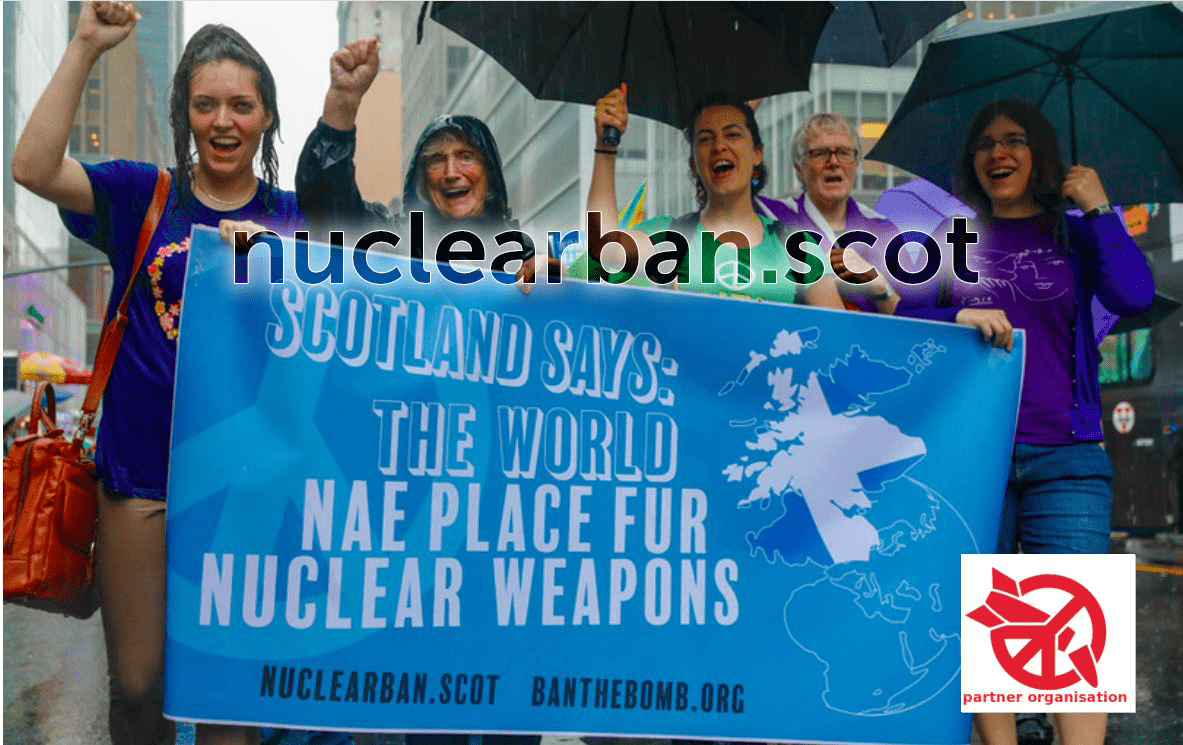The Scottish people and our civic institutions can be effective as stakeholders and contributors to stability, human rights and sustainability, both here, and across the world,
The Treaty on the Prohibition of Nuclear Weapons (TPNW) adopted in 2017 is now supported by the majority of the UN States. Mainstream media nor BBC address its importance for Scotland.
The UK’s nuclear weapons are deployed at Faslane and Coulport, bereft of Scottish Government consent.
Without any credible alternative site in the rest of the UK, ancient boats and weapons well past their sell-by date are creeping about the world under other states’ surveillance, dependent on US co-operation.
Parts are leased from the US Government, currently under the volatile control of Donald Trump.
Scotland has resisted nuclear weapons since the sixties! See the story, and keep the pressure on!

SCREENING NEWS
Return here to watch FREE from 26 March -7 May 2026
The TPNW comprehensibly completely bans anything to do with nuclear weapons, it recognises the disproportionate impact of nuclear weapons on women’s human rights, indigenous communities and the environment,
like a litmus test for all the ScotGov policies on climate, migration, arms trading, IHL and Israel/Palestine.
ICAN’s Parliamentarian Pledge aims to get every country to sign the TPNW, now. More details on the Parliamentary page.
NATO stands for the North Atlantic Treaty Organisation, and while it sadly remains NATO policy that this military alliance is nuclear-armed, there is nothing in the North Atlantic Treaty itself that means that having a nuclear weapon is a binding obligation. A policy can be changed. Joining The Treaty on the Prohibition of Nuclear Weapons involves an absolute commitment, tied into the state’s own legislation to include its terms in the law of the land. For those nations that are party to it, the treaty prohibits the development, testing, production, stockpiling, stationing, transfer, use and threat of use of nuclear weapons, as well as assistance and encouragement to the prohibited activities. Ireland, a UN member state not too far from Scotland , has gone even further. Under Irish domestic as well as international humanitarian law, no state can put nuclear weapons on their soil.
That is why it is so important that a future independent nuclear free Scotland accedes to the TPNW as a first move for protection from threats and harassment from the UK and the US, as it would be supported by the states who have already signed the treaty which entered into force in January 2021.
Currently, out of 193 UN Member states, the TPNW has 94 signatories, (73 of which have completed full ratification). There are 9 nuclear armed states. Europe (as defined in the Herald article) is in a minority of global regions.
Large areas of the world comprise Nuclear Weapons Free Zones, agreed by treaty:
Treaty of Tlatelolco: For Latin America and the Caribbean.
Treaty of Rarotonga: For the South Pacific
Treaty of Bangkok: For Southeast Asia.
Treaty of Pelindaba: For Africa.
Central Asia NWFZ Treaty: For Central Asia.
Mongolia: a single-state NWFZ.
Antarctica, the seabed, and outer space are also designated as non-nuclear zones.
All of this information has been regularly provided to Scotland’s elected representatives and to mainstream media in Scotland frequently; in press releases and well-researched factual reports on the development and negotiations for the TPNW by those working for it since the inception of the International Campaign for the Abolition of Nuclear Weapons in 2007, as was equally robust work undertaken by Scottish CND, Trident Ploughshares, and Nukewatch. These have included appropriate citations and references
Mr Arnold can say that “NATO membership and trying to remove the nuclear side of the naval base at Faslane are completely incompatible” and
“If an independent Scotland wanted to join NATO it would have to accept the nuclear base at Faslane as a permanent facility”, but the Herald should at least make it clear that this is his view, and not an accurate explanation of the reality of treaty law. Theu have a responsibiity to offer something a bit clearer
I am deeply saddened that the days are past when Scottish MPs could be counted on to join the disarmament movement on the road at Faslane and Coulport, but if Mr Doogan is one of those SNP politicians who has forgotten the rise of the SNP as ‘the Bairns not Bombs party’ and he really believes that defence will not feature as a material consideration for next year’s election, I hope that he is mistaken. “Defence is reserved to Westminster and there is nothing quite as reserved as defence” he says, but if it abandons nuclear disarmament, the SNP (and others seeking to secure Scotland’s independence) will haemorrhage members and supporters at an unprecedented rate.
We are to consider who to elect the next Scottish Parliament; a different proposition than a Westminster election, where Scotland has only 59 MPs out of 660. In some parts of Scotland only14% of the electorate thought that it was worth turning out for the so-called Labour landslide at the most recent UK election. If this article is the best military and security analysis that the Herald, a Scottish national paper, can provide to inform us on the issues, devolved or reserved, then Heaven help us all.
The Scottish election will be decided through a more democratically obtained choice, and so the voters deserve that nuclear disarmament and the UK base at Faslane, a critical element in the debate is presented properly and responsibly, so that we can face the reality of what would make this a safer country. We want a parliament and government for Scotland that will stand aside from relentless and dangerous rise in militarism and threats, especially nuclear threats and focus on policies and practices for a well being economy and securing human rights, actually making this a safer welcoming,greener and fairer country in the world community.


















